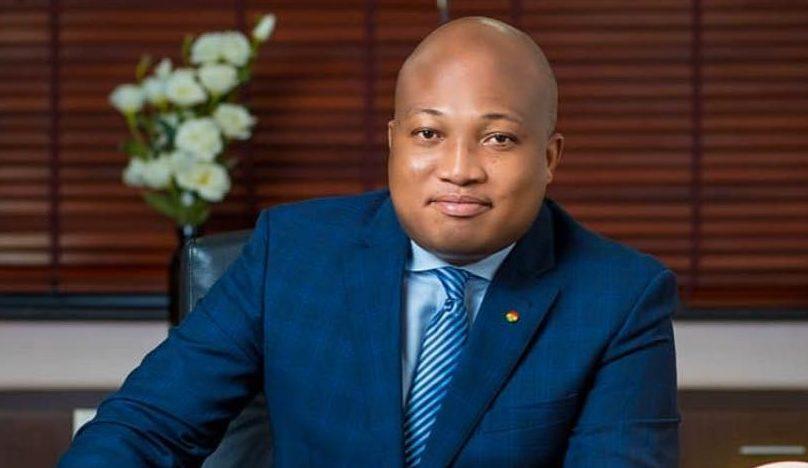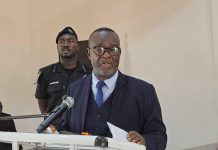Africa-Press – Ghana. Ghana is poised to gain an estimated US$150 million in additional revenue following the United States Government’s reversal of a 15 per cent tariff earlier imposed on Ghanaian agricultural exports, Mr Samuel Okudzeto Ablakwa, Foreign Affairs Minister, said on Monday.
The Minister, who spoke in an interview on the sidelines of the seventh EU-AU Summit in Luanda, Angola, described the tariff removal as a timely economic boost and a major diplomatic achievement for the country.
Leaders of the European Union (EU) and the African Union (AU) have met in Luanda on the theme: “Promoting peace and prosperity through effective multilateralism.”
The summit will mark 25 years of EU-AU partnership as well as the 50th anniversary of independence for Angola and several other African countries.
It is co-chaired by Angolan President João Lourenço and President of the European Council António Costa, with additional representation from the European Commission President Ursula von der Leyen and the Chair of the African Union Commission, Mr Mahmoud Ali Youssouf.
Mr Ablakwa recalled that earlier this year, President Donald Trump signed an executive order introducing what the U.S. termed “reciprocal tariff arrangements,” which resulted in Ghana being slapped first with a 10 per cent tariff and later a 15 per cent tariff on a range of agricultural exports.
He said the new executive order reversing the tariff restores a zero-rated regime for Ghanaian cocoa, both beans and semi-processed products, as well as plantain, guava, maize, peppers, tomatoes, avocados, ginger and other qualifying exports.
“So the 15 percent tariff has been reversed. It is now zero per cent on Ghanaian cocoa, and it is not only on the cocoa beans but also on semi-processed cocoa. This development is really positive,” he said, emphasising that the change would have a direct impact on Ghana’s economic recovery efforts.
Mr Ablakwa said the government estimates showed that the cocoa sector alone stood to raise an additional US$60 million from the reversal, with other agricultural exports contributing nearly US$100 million more.
“The conservative estimates we have done show this will raise additional about 150 million dollars for our revenues and a boost for our economy,” he said.
The announcement arrives at a crucial moment for Ghanaian farmers who have recorded high yields this season but have been struggling with excess supply and limited markets.
“Our farmers have had a glut. Production has been very good this farming season, and they have been complaining about the lack of market and the lack of buyers,” he explained.
The tariff removal, the minister said, ensured that exporters could “move in quickly” to the U.S. market and secure competitive returns.
He noted that the agricultural sector employed the largest share of Ghana’s workforce, meaning the positive effects of the development would be felt widely across rural communities and by agribusinesses.
“This development will really help the majority of Ghanaian workers who were affected by this 15% tariff imposition,” the Foreign Minister said.
He said the tariff removal was one of several encouraging shifts in Ghana-U.S. relations in recent months, citing the restoration of the five-year visa regime after the U.S. rescinded earlier restrictions, following negotiations he led.
“This is the second positive development,” he added, noting that negotiations continued on a number of outstanding issues
High among these is Ghana’s push for the removal of a similar 15 per cent tariff imposed on exports under the African Growth and Opportunity Act (AGOA).
Mr Ablakwa argued that the measure undermined gains made by Ghana’s textile and garment industry, saying: “AGOA allowed for tariff-free exports of garments from countries like Ghana into the U.S. market.”
Government, he said, was working to have the full benefits of AGOA restored to support manufacturers and spur job creation.
He encouraged small- and medium-scale exporters, agribusinesses, and young entrepreneurs to take advantage of the renewed opportunity to expand production, add value, and increase exports.
“We want to also encourage medium and small-scale exporters and entrepreneurs to take up this opportunity so that they can have good returns on their investment.”
Mr Ablakwa reaffirmed Ghana’s commitment to strengthening economic diplomacy, expanding partnerships, and positioning Ghanaian products competitively on the global market.
With the EU-AU summit expected to focus on peace, prosperity, and multilateral cooperation, he said Ghana remained optimistic that the country’s diplomatic engagements would yield further positive outcomes.
For More News And Analysis About Ghana Follow Africa-Press







